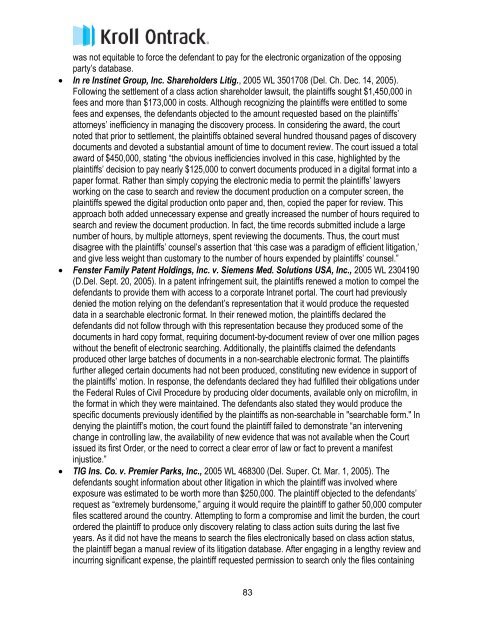Electronic Discovery and Computer Forensics Case List - Kroll Ontrack
Electronic Discovery and Computer Forensics Case List - Kroll Ontrack
Electronic Discovery and Computer Forensics Case List - Kroll Ontrack
Create successful ePaper yourself
Turn your PDF publications into a flip-book with our unique Google optimized e-Paper software.
was not equitable to force the defendant to pay for the electronic organization of the opposing<br />
party’s database.<br />
� In re Instinet Group, Inc. Shareholders Litig., 2005 WL 3501708 (Del. Ch. Dec. 14, 2005).<br />
Following the settlement of a class action shareholder lawsuit, the plaintiffs sought $1,450,000 in<br />
fees <strong>and</strong> more than $173,000 in costs. Although recognizing the plaintiffs were entitled to some<br />
fees <strong>and</strong> expenses, the defendants objected to the amount requested based on the plaintiffs’<br />
attorneys’ inefficiency in managing the discovery process. In considering the award, the court<br />
noted that prior to settlement, the plaintiffs obtained several hundred thous<strong>and</strong> pages of discovery<br />
documents <strong>and</strong> devoted a substantial amount of time to document review. The court issued a total<br />
award of $450,000, stating “the obvious inefficiencies involved in this case, highlighted by the<br />
plaintiffs’ decision to pay nearly $125,000 to convert documents produced in a digital format into a<br />
paper format. Rather than simply copying the electronic media to permit the plaintiffs’ lawyers<br />
working on the case to search <strong>and</strong> review the document production on a computer screen, the<br />
plaintiffs spewed the digital production onto paper <strong>and</strong>, then, copied the paper for review. This<br />
approach both added unnecessary expense <strong>and</strong> greatly increased the number of hours required to<br />
search <strong>and</strong> review the document production. In fact, the time records submitted include a large<br />
number of hours, by multiple attorneys, spent reviewing the documents. Thus, the court must<br />
disagree with the plaintiffs’ counsel’s assertion that ‘this case was a paradigm of efficient litigation,’<br />
<strong>and</strong> give less weight than customary to the number of hours expended by plaintiffs’ counsel.”<br />
� Fenster Family Patent Holdings, Inc. v. Siemens Med. Solutions USA, Inc., 2005 WL 2304190<br />
(D.Del. Sept. 20, 2005). In a patent infringement suit, the plaintiffs renewed a motion to compel the<br />
defendants to provide them with access to a corporate Intranet portal. The court had previously<br />
denied the motion relying on the defendant’s representation that it would produce the requested<br />
data in a searchable electronic format. In their renewed motion, the plaintiffs declared the<br />
defendants did not follow through with this representation because they produced some of the<br />
documents in hard copy format, requiring document-by-document review of over one million pages<br />
without the benefit of electronic searching. Additionally, the plaintiffs claimed the defendants<br />
produced other large batches of documents in a non-searchable electronic format. The plaintiffs<br />
further alleged certain documents had not been produced, constituting new evidence in support of<br />
the plaintiffs’ motion. In response, the defendants declared they had fulfilled their obligations under<br />
the Federal Rules of Civil Procedure by producing older documents, available only on microfilm, in<br />
the format in which they were maintained. The defendants also stated they would produce the<br />
specific documents previously identified by the plaintiffs as non-searchable in "searchable form." In<br />
denying the plaintiff’s motion, the court found the plaintiff failed to demonstrate “an intervening<br />
change in controlling law, the availability of new evidence that was not available when the Court<br />
issued its first Order, or the need to correct a clear error of law or fact to prevent a manifest<br />
injustice.”<br />
� TIG Ins. Co. v. Premier Parks, Inc., 2005 WL 468300 (Del. Super. Ct. Mar. 1, 2005). The<br />
defendants sought information about other litigation in which the plaintiff was involved where<br />
exposure was estimated to be worth more than $250,000. The plaintiff objected to the defendants’<br />
request as “extremely burdensome,” arguing it would require the plaintiff to gather 50,000 computer<br />
files scattered around the country. Attempting to form a compromise <strong>and</strong> limit the burden, the court<br />
ordered the plaintiff to produce only discovery relating to class action suits during the last five<br />
years. As it did not have the means to search the files electronically based on class action status,<br />
the plaintiff began a manual review of its litigation database. After engaging in a lengthy review <strong>and</strong><br />
incurring significant expense, the plaintiff requested permission to search only the files containing<br />
83

















